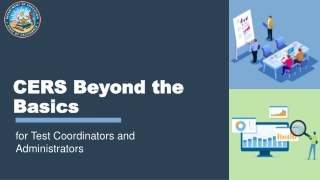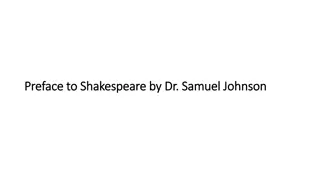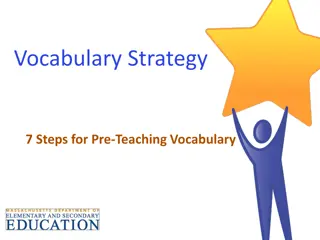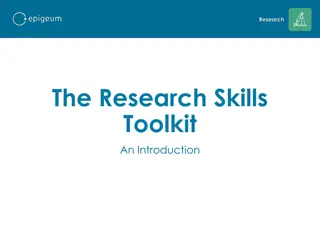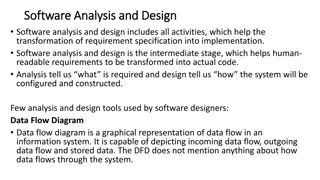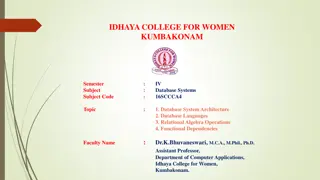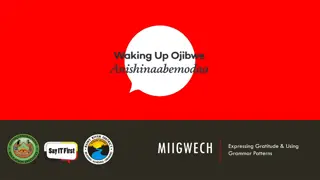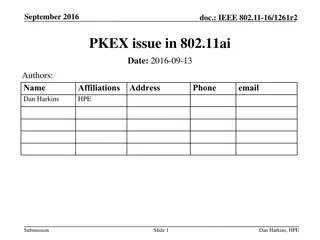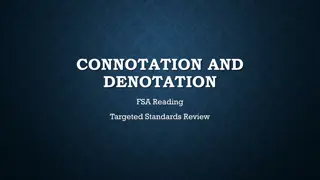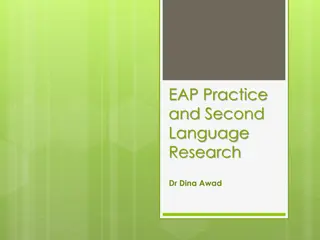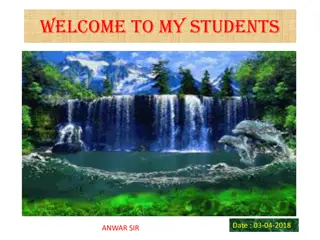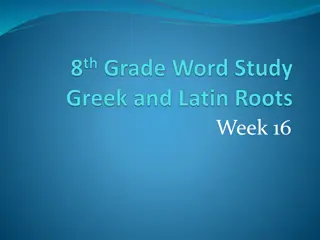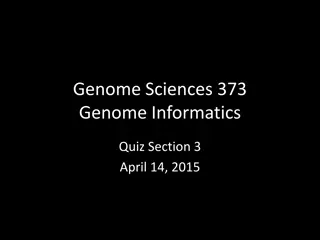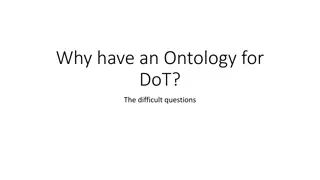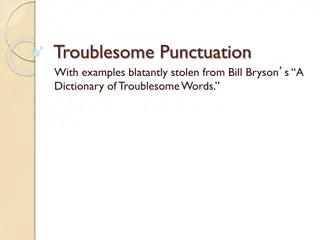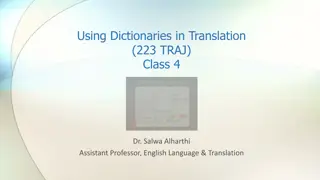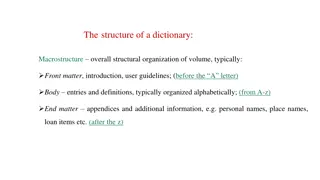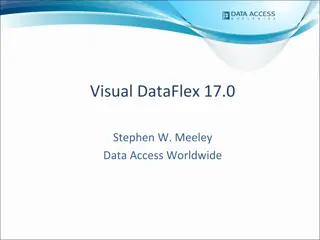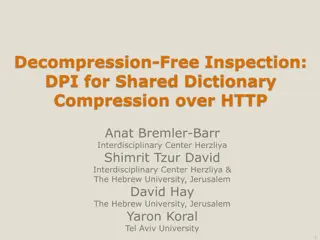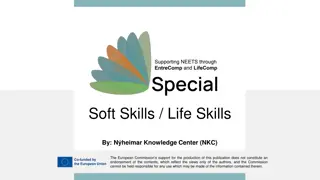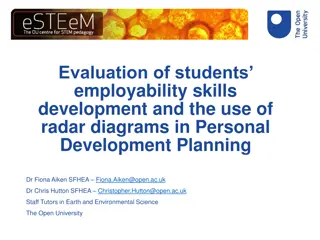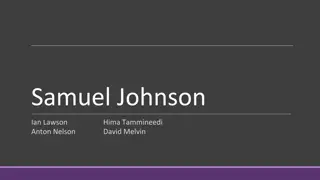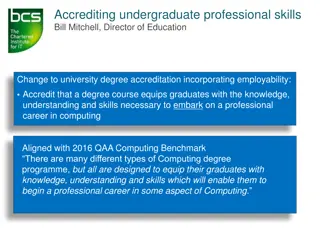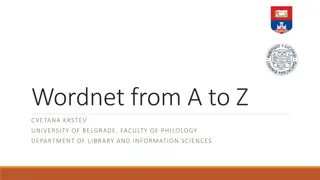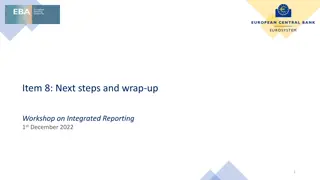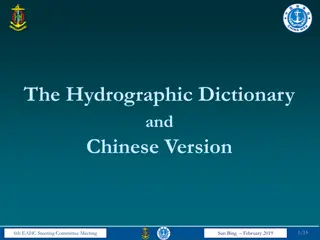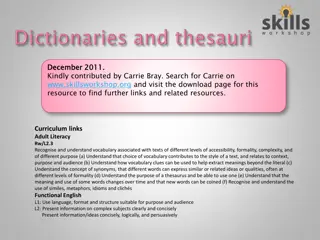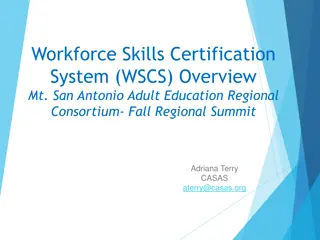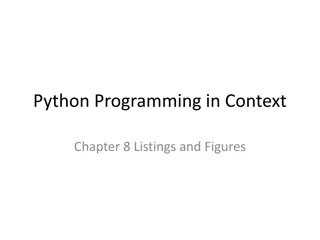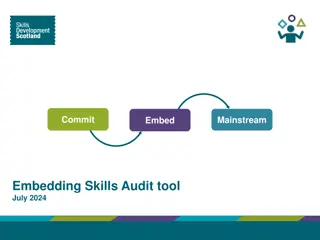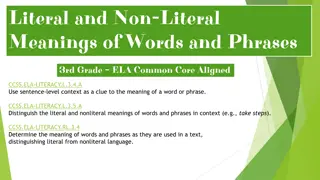World Health Day Celebrations and Definitions of Health
The World Health Day, observed on April 7 each year since 1950, marks the founding of WHO and promotes global health awareness. It emphasizes the importance of access to quality healthcare. The theme for 2023 focuses on recognizing the contributions of nurses and midwives. Definitions of health from
8 views • 19 slides
CERS Beyond the Basics
Dive into the advanced aspects of CERS, covering district and school exports, data dictionary, user roles, and more. Learn how to utilize CERS effectively for managing assessments and accessing crucial educational data.
1 views • 38 slides
Preface to Shakespeare by Dr. Samuel Johnson
Dr. Samuel Johnson (1709-1784) was a significant figure in English literature, known for his celebrated dictionary and prolific writing in various genres. In his preface to Shakespeare's works, Johnson discusses the tendency to favor past excellence over present, analyzing Shakespeare's enduring acc
1 views • 12 slides
Effective Pre-Teaching Vocabulary Strategies for ELs
ELs benefit from specific pre-teaching vocabulary strategies such as selecting important words, providing contextual understanding, offering student-friendly definitions, and engaging in oral interactions. Massachusetts Department of Elementary and Secondary Education emphasizes the importance of ch
2 views • 7 slides
Importance of Teaching Life Skills for Healthy Child Development
Life skills education plays a crucial role in promoting healthy child and adolescent development by enhancing adaptive behavior, problem-solving abilities, and social skills. It encompasses three core areas: thinking skills, social skills, and emotional skills. Teaching life skills is essential for
4 views • 15 slides
Mastering the Use of a Dictionary
Explore the comprehensive guide on leveraging a dictionary effectively, focusing on the nuanced aspects of English language use, the importance of a strategic learning approach, and the necessity to delve beyond mere translations. Learn how to enhance your vocabulary acquisition by understanding the
0 views • 46 slides
Vocabulary Coverage and Reading Comprehension of University EFL Learners
University EFL learners' reading comprehension is closely linked to their vocabulary knowledge. A broad vocabulary positively impacts reading ability, with 98% vocabulary coverage facilitating successful reading without dictionary support. Indonesian high school graduates typically have a lower voca
0 views • 17 slides
Enhancing Research Skills with Epigeum's Research Skills Toolkit
Epigeum, a leading provider of online courseware, offers the Research Skills Toolkit, comprising five core programs designed to equip postgraduate researchers with key skills and knowledge. Developed from the Research Skills Master Programme, the Toolkit integrates interactive learning design, user-
1 views • 9 slides
Significance of Models in Agricultural Geography
Models play a crucial role in various disciplines, including agricultural geography, by offering a simplified and hypothetical representation of complex phenomena. When used correctly, models help in understanding reality and empirical investigations, but misuse can lead to dangerous outcomes. Longm
0 views • 8 slides
Understanding Software Analysis and Design
Software analysis and design is an essential stage in the software development process, bridging requirements with implementation. It involves tools like Data Flow Diagrams (DFD) to depict data flow within a system. Types of DFD include Logical and Physical, each focusing on different aspects of dat
1 views • 33 slides
Overview of Database Systems Architecture and Languages
A database system is essential for storing and managing an organization's data. The architecture includes components like file manager, database manager, and query processor. Additionally, DML and DDL compilers play crucial roles in handling data manipulation and definition tasks. Various data struc
2 views • 28 slides
Embracing Gratitude: An Exploration of Ojibwe Language Patterns
Discover the significance of expressing gratitude in Ojibwe culture through grammar patterns and verb forms. Learn about inanimate and animate verbs, conjugations, and use of the Ojibwe People's Dictionary. Dive into the language of thankfulness and the importance of simple gratefulness expressions.
1 views • 38 slides
Grammar on the Go: PowerEd Express - Unit 4 Lesson 3 Corrections
Correcting sentence errors in red and adding vocabulary words to your personal dictionary for Unit 4 Lesson 3 of Grammar on the Go: PowerEd Express. Learn about using commas, identifying sentence types, capitalization rules, and more.
1 views • 10 slides
Understanding PKEX Issues in IEEE 802.11-16/1261r2
This presentation delves into the problems related to PKEX (Public Key Exchange) in the context of IEEE 802.11-16/1261r2 standard. It discusses the PKEX exchange process, associated vulnerabilities, and the need for ensuring secure key exchange to prevent offline dictionary attacks and man-in-the-mi
1 views • 11 slides
Understanding Connotation and Denotation in Language
Explore the concepts of connotation and denotation in language through examples and explanations. Understand how words convey emotional weight and associations beyond their dictionary definitions. Delve into the significance of connotations in shaping our perceptions of words and their meanings.
0 views • 9 slides
Insights into Second Language Learning Research
This presentation delves into various aspects of second language learning research, including the use of dictionaries, part-of-speech explanation, grammatical rules, and bilingual dictionary use. Studies show mixed results on the effectiveness of meta-analysis in form-focused instruction and the imp
0 views • 26 slides
Understanding Words: Meaning and Usage Lessons
Explore the topic of word meanings with Anwar Sir in Class-8 English Lesson. Learners will develop skills in using a dictionary, identifying different meanings, and providing examples. Engage in activities and discussions to enhance vocabulary knowledge.
0 views • 11 slides
Understanding Connotation and Denotation in Language
Connotation and denotation play crucial roles in assigning meaning to words. While denotation refers to the literal dictionary definition of a word, connotation involves the emotional and imaginative associations surrounding it. This distinction is exemplified through words like "house" and "home,"
0 views • 21 slides
Understanding Greek and Latin Roots: Therm and Dict
Explore the meanings of Greek root "therm" and Latin root "dict" through words like thermometer, geothermal, thermostat, dictionary, contradict, and more. Discover how these roots relate to concepts of heat, temperature regulation, and speaking. Dive into examples of their usage in various contexts.
0 views • 17 slides
Genome Sciences 373: Informatics Quiz, Python Dictionaries, and Conditional Statements Overview
Today's session covers topics such as Python dictionaries with in-class examples, iterating through dictionary entries, counting repeating characters in a string, and understanding if/elif/else statements. The session also includes a discussion on combining tests in Python and comparisons operators.
0 views • 41 slides
Importance of Ontology in System Development for DoT
Ontology plays a crucial role in the development of systems for DoT by facilitating the automation of tasks, improving consistency, and enhancing the efficiency of tool chains. It enables the transformation of semantic descriptions into algorithms, streamlining processes and reducing the need for ma
0 views • 7 slides
Mastering Punctuation: A Guide to Handling Tricky Punctuation Marks
Explore the nuances of troublesome punctuation marks with examples borrowed from Bill Bryson's work, "A Dictionary of Troublesome Words." Unravel the mysteries behind apostrophes, learn about shared ownership, possessives, contractions, and exceptions. Delve into the correct use of colons and minor
0 views • 35 slides
Understanding Reference and Inference in Linguistics
Discussing deixis, the act of reference in language is explained as a way for speakers and writers to enable listeners and readers to identify entities. Reference involves using proper nouns, phrases, pronouns, and even invented names. Inference plays a crucial role in successful acts of reference,
0 views • 11 slides
Understanding the Role of Dictionaries in Translation
Dictionaries play a crucial role in translation by helping users find information about linguistic signs, word division, spelling, and word formation. The lemma serves as a representative of a lexical item in a dictionary, aiding users in locating specific entries. Word division information can assi
0 views • 12 slides
Understanding the Structure of a Dictionary and Word Definitions
Explore the macrostructure and microstructure of a dictionary, including the front matter, body entries, and end matter. Learn about stress, part of speech, synonyms, cross-references, collocations, and more. Additionally, uncover the definition and characteristics of a word, addressing the query of
0 views • 23 slides
Updates and Enhancements in Visual DataFlex 17.0
Enhance your development experience with Visual DataFlex 17.0. Longer table and column names, studio improvements, and new features like automatic TODO support make coding easier. Enjoy improved workspace dashboard, multi-file search capabilities, and enhanced data dictionary functionalities. Upgrad
0 views • 23 slides
Dictionary Compression and Deep Packet Inspection (DPI) Overview
This content discusses Decompression-Free Inspection (DPI) for shared dictionary compression over HTTP, the challenges and solutions in deep packet inspection (DPI), compressed HTTP methods, examples of intra-response and inter-response compression, and current operations of Network Intrusion Detect
0 views • 33 slides
Soft Skills and Life Skills Overview
Soft skills, also known as life skills or people skills, encompass interpersonal and social abilities that enable effective interaction with others. They are acquired through daily life experiences and reflections, in contrast to hard skills gained through formal education. This overview delves into
0 views • 36 slides
Evaluation of Students' Employability Skills Development Using Radar Diagrams in Personal Development Planning
This study focuses on assessing students' employability skills development through the use of radar diagrams in Personal Development Planning (PDP). The research evaluated students' self-assessment and reflection on skills improvement with a specific focus on collaborating with others and self-refle
0 views • 18 slides
Computer Lexicography: Bridging Linguistics and Technology in Digital Dictionaries.
Computer lexicography explores the intersection of linguistics and technology to develop effective systems for creating and utilizing lexical resources in digital environments. The shift from traditional paper dictionaries to digital formats like the Spanish Language Dictionary (DLE 23) signifies a
0 views • 26 slides
The Life and Literary Contributions of Samuel Johnson
Born in 1709 in Lichfield, England, Samuel Johnson overcame early health challenges to become a renowned English writer. He wrote various literary works, including the influential "A Dictionary of the English Language." Despite facing personal struggles, his contributions to English literature remai
0 views • 17 slides
Accreditation Evolution for Computing Degree Programs
Bill Mitchell, Director of Education, proposes an evolution in university degree accreditation to incorporate employability skills for graduates pursuing professional careers in computing. The accreditation process emphasizes aligning with national skills criteria, engaging employers, and recognizin
0 views • 16 slides
Overview of WordNet: History, Definition, Authors, and Usage
WordNet is a lexical database for the English language, grouping words into synonym sets, providing definitions, and recording relations among these sets. It serves as a dictionary and thesaurus, with primary use in text analysis and AI. Created at Princeton University under George Miller and direct
0 views • 59 slides
Integrated Reporting Workshop Wrap-Up and Next Steps
The workshop on integrated reporting held on 1st December 2022 focused on enhancing proposals, planning JBRC setup, data dictionary governance, semantic integration, and more. The roadmap for 2023 includes topics like data granularity, governance, and continuous work on semantic and syntactic layers
0 views • 4 slides
Hydrographic Dictionary Implementation Overview
The Hydrographic Dictionary (HD) outlined key principles, layout, updating procedures, GI registry, and structure during the 6th EAHC Steering Committee Meeting. It emphasized the unique IHO reference number, terms selection process, and approval mechanisms by HSSC. The procedure for updating terms
0 views • 16 slides
Vocabulary Skills and Resource Exploration
Explore the nuances of vocabulary, the differences between dictionaries and thesauruses, and the importance of using these tools effectively. Discover how to enhance your language skills through dictionary definitions, synonym identification, and the use of a thesaurus. Engage in activities to stren
0 views • 8 slides
WSCS - Workforce Skills Certification System Overview
The Workforce Skills Certification System (WSCS) aims to help learners transition into the workforce by developing and certifying their work readiness skills valued by employers. Through a three-step process, learners can profile, develop, and certify their skills to increase employability. The syst
0 views • 27 slides
Advanced Examples of Using Dictionaries and Lists in Python Programming
Explore more advanced techniques such as dictionary manipulation, list operations, pattern matching with regular expressions, and using simple programs to solve complex problems in Python programming. Discover methods like cryptanalysis, code breaking, frequency analysis, and rail fence decryption t
0 views • 22 slides
Embedding Skills Audit Tool: Self-Evaluation Guide for Establishments
The Embedding Skills Audit Tool is designed to help establishments self-evaluate their skills approach against illustrative statements for the commit, embed, and mainstream stages. This tool provides guidance on scoring, focused discussions, and action planning to enhance skills implementation. By f
0 views • 7 slides
Understanding Literal and Non-Literal Meanings of Words and Phrases in 3rd Grade ELA
Literal language refers to the dictionary meaning of words, while non-literal language involves expressions that go beyond literal interpretation, such as idioms. By using context clues, students can distinguish between literal and non-literal meanings, enhancing their reading comprehension skills.
0 views • 14 slides

